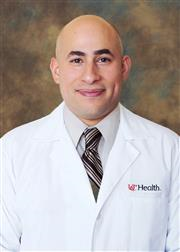
Dr. Hani Kushlaf, MD
Physician
Neurology
Specialty
Clinical Neurophysiology
Provide FeedbackMedical Expertise of Dr. Hani Kushlaf, MD
Dr. Kushlaf specializes in neuromuscular medicine, completing three fellowships in muscle disease and peripheral nerve disorders. He diagnoses, treates and manages a variety of neurological disorders, including inherited and acquired peripheral neuropathies, plexopathies, myopathies, muscular dystrophies, ALS, motor neuron disorders, and neuromuscular junction disorders (myasthenia gravis and Lambert-Eaton myasthenic syndrome).
About Dr. Hani Kushlaf, MD
Hani Kushlaf, MD is a board-certified neurologist providing care to patients in Cincinnati at UC Health where he serves as Associate Professor of Neurology and Pathology.
Procedures & Services
Patient Education Resources
How do I know if my mother's forgetfulness has become Alzheimer's Disease
Alzheimer's disease is a progressive, degenerative disorder that affects memory, thinking, and behavior. It is the most common cause of dementia in older adults.Symptoms of Alzheimer's disease...
Alzheimer's disease is a progressive, degenerative disorder that affects memory, thinking, and behavior. It is the most common cause of dementia in older adults.Symptoms of Alzheimer's disease...
I snore regularly. Should I be worried about sleep apnea?
Snoring is a common symptom of sleep apnea, a serious sleep disorder that causes a person to stop breathing for short periods of time during sleep. People with sleep apnea often snore loudly and frequ...
Snoring is a common symptom of sleep apnea, a serious sleep disorder that causes a person to stop breathing for short periods of time during sleep. People with sleep apnea often snore loudly and frequ...
What can I do for my child's frequent headaches?
Frequent headaches in children can be caused by a variety of factors, including stress, anxiety, poor sleep, and certain foods or drinks. Here are a few things you can do to help alleviate your child&...
Frequent headaches in children can be caused by a variety of factors, including stress, anxiety, poor sleep, and certain foods or drinks. Here are a few things you can do to help alleviate your child&...
What is disease-modifying therapy for multiple sclerosis?
Disease-modifying therapy (DMT) for multiple sclerosis (MS) is a type of treatment that aims to slow down the progression of the disease and reduce the frequency and severity of relapses. DMTs work by...
Disease-modifying therapy (DMT) for multiple sclerosis (MS) is a type of treatment that aims to slow down the progression of the disease and reduce the frequency and severity of relapses. DMTs work by...
When should I consider starting disease-modifying therapy for multiple sclerosis?
The decision to start disease-modifying therapy (DMT) for multiple sclerosis (MS) is usually based on the type and severity of the disease, as well as the person's individual needs and preferences...
The decision to start disease-modifying therapy (DMT) for multiple sclerosis (MS) is usually based on the type and severity of the disease, as well as the person's individual needs and preferences...
Education & Training
- Medical School: University of Tripoli School of Medicine
- Neurology Residency: University of Kentucky
- Fellowship in Muscle Disease: Mayo Clinic
- Fellowship in Peripheral Nerve Disease: Mayo Clinic
- Fellowship in Advanced Neuromuscular Medicine: Duke University Medical Center